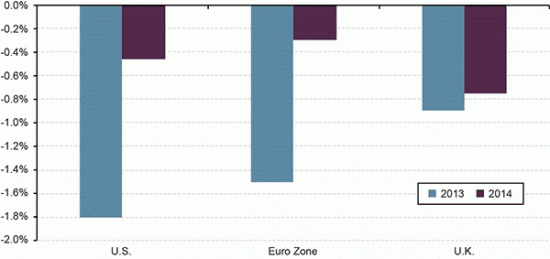One of the big themes from 2013 was the “fiscal drag” from reductions in government spending. Many thought the sequester and other measures would torpedo the US economy. But it never happened. In fact, growth came in pretty strong for the year as a whole. But still, it’s hard to say whether there is a counterfactual where growth might have been higher. We just don’t know.
I have to admit that I question how much the fiscal drag in 2013 really amounted to. After all, total government spending hasn’t decline at all year over year and the cumulative budget deficit is still running at over $1T when you include state and local government spending. That’s well down from a few years ago when it was over $1.5T, but I wouldn’t exactly call that “austerity”. Rather, it’s been mostly due to higher tax receipts and not self imposed spending cuts.
Still, analysts are expecting reduced fiscal drag in 2014 which is likely to come in large part from increases in state and local government spending (where there were real cuts in recent years). And it’s not just a US phenomenon. According to Guggenheim this is a global event:
“Major advanced economies (with the notable exception of Japan) should in 2014 have significantly less fiscal policy drag on growth. Leading the way is the United States, where sequester-mandated budget cuts will decrease and the effects of higher payroll taxes should diminish. The euro zone should also benefit as budgetary austerity fades. Britain should also have a slightly smaller fiscal drag.
Overall it’s a rosier picture for global growth in 2014, as economies around the world should benefit from faster growth, especially since demand is improving in advanced economies that make up over 40 percent of global GDP.”
Mr. Roche is the Founder and Chief Investment Officer of Discipline Funds.Discipline Funds is a low fee financial advisory firm with a focus on helping people be more disciplined with their finances.
He is also the author of Pragmatic Capitalism: What Every Investor Needs to Understand About Money and Finance, Understanding the Modern Monetary System and Understanding Modern Portfolio Construction.


Comments are closed.